医学生热点主题英语作文
医学生励志英文演讲稿范文
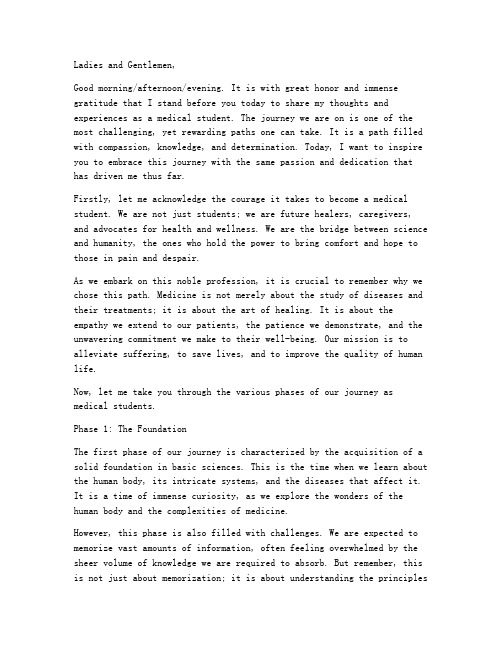
Ladies and Gentlemen,Good morning/afternoon/evening. It is with great honor and immense gratitude that I stand before you today to share my thoughts and experiences as a medical student. The journey we are on is one of the most challenging, yet rewarding paths one can take. It is a path filled with compassion, knowledge, and determination. Today, I want to inspire you to embrace this journey with the same passion and dedication that has driven me thus far.Firstly, let me acknowledge the courage it takes to become a medical student. We are not just students; we are future healers, caregivers, and advocates for health and wellness. We are the bridge between science and humanity, the ones who hold the power to bring comfort and hope to those in pain and despair.As we embark on this noble profession, it is crucial to remember why we chose this path. Medicine is not merely about the study of diseases and their treatments; it is about the art of healing. It is about the empathy we extend to our patients, the patience we demonstrate, and the unwavering commitment we make to their well-being. Our mission is to alleviate suffering, to save lives, and to improve the quality of human life.Now, let me take you through the various phases of our journey as medical students.Phase 1: The FoundationThe first phase of our journey is characterized by the acquisition of a solid foundation in basic sciences. This is the time when we learn about the human body, its intricate systems, and the diseases that affect it. It is a time of immense curiosity, as we explore the wonders of the human body and the complexities of medicine.However, this phase is also filled with challenges. We are expected to memorize vast amounts of information, often feeling overwhelmed by the sheer volume of knowledge we are required to absorb. But remember, this is not just about memorization; it is about understanding the principlesthat govern the human body. Embrace the learning process, ask questions, and never be afraid to seek help. The foundation you build now will serve as the backbone of your future practice.Phase 2: Clinical ExposureAs we progress, we move into the clinical phase of our training. This is where the theoretical knowledge we acquired in the classroom begins to make sense. We start to see patients, to interact with healthcare professionals, and to experience the reality of medicine.This phase is where we learn about the importance of communication, teamwork, and critical thinking. We witness the impact of our actions on patients' lives and understand the gravity of our responsibilities. Itis a time of immense growth, as we develop our clinical skills and our ability to connect with patients on a personal level.During this phase, we may encounter moments of doubt and frustration. We may question our abilities and our worth. But remember, these challenges are not setbacks; they are opportunities for growth. Each patient encounter, each clinical decision, is a learning experience that will shape us into the doctors we aspire to be.Phase 3: Professional DevelopmentAs we near the end of our medical school journey, we enter the phase of professional development. This is the time when we start to think about our future, our specialty, and the kind of doctor we want to become. It is a time of reflection and self-discovery.We are encouraged to explore various fields of medicine, to shadow professionals, and to participate in research projects. This phase is crucial in helping us find our passion and direction. It is a time to connect with mentors, to seek advice, and to develop our professional identity.During this phase, we may feel the pressure to make important decisions about our future. But remember, this is not a race. Take your time, do your research, and choose a path that aligns with your values andaspirations. The journey of medicine is long, and it is important to be happy and fulfilled in what we do.Phase 4: The FutureFinally, we arrive at the culmination of our journey. We are about to become doctors, ready to face the world with knowledge, compassion, and courage. This is the phase where we will put into practice everything we have learned, where we will be responsible for the health and well-being of others.As we step into our new roles, we must never forget the principles that have guided us thus far. We must remain compassionate, committed, and determined. We must continue to learn, to grow, and to adapt to theever-changing landscape of medicine.In conclusion, the path of medicine is a challenging one, but it is also one of the most fulfilling. It is a journey that requires us to be lifelong learners, to be empathetic, and to be dedicated to the service of humanity. As medical students, we have the privilege of shaping the future of healthcare. Let us embrace this journey with passion, knowledge, and determination.Thank you for your time and attention. May we all become the healers we aspire to be, making a difference in the lives of those we touch.God bless us all on this noble path.Thank you.。
以医学类为主题的英语作文

以医学类为主题的英语作文Title: The Miracle of Modern MedicineIn the tapestry of human progress, medicine stands as a beacon of hope, weaving together threads of scientific discovery, compassion, and the relentless pursuit of healing. As we traverse the landscape of modernity, the transformative power of medical advancements illuminates our path, transforming lives and reshaping the very fabric of human existence.From the dawn of civilization, humankind has grappled with the mysteries of disease and injury. Ancient civilizations, through trial and error, amassed a rudimentary knowledge of herbs and remedies. Yet, it is the dawn of the modern era that has witnessed a quantum leap in medical understanding and intervention. The advent of antibiotics, vaccines, and advanced surgical techniques has revolutionized healthcare, pushing back the boundaries of mortality and extending the boundaries of human potential.The field of genetics, in particular, has emerged as a cornerstone of modern medicine. With the completion of the Human Genome Project, scientists have unlocked the blueprint of life, paving the way forpersonalized medicine, gene therapies, and even the possibility of eradicating genetic diseases. This genetic revolution holds the promise of a future where treatments are tailored to an individual's unique genetic makeup, maximizing efficacy and minimizing side effects.Moreover, the integration of technology into medicine has transformed diagnosis and treatment. Medical imaging technologies such as MRI, CT scans, and ultrasound have enabled doctors to see inside the human body with unprecedented clarity, facilitating early detection and targeted interventions. Telemedicine and wearable devices have made healthcare more accessible, especially in remote areas, bridging the gap between patients and healthcare professionals.Yet, amidst these triumphs, medicine remains a humble endeavor, ever mindful of its limitations and the ethical dilemmas it presents. The COVID-19 pandemic has underscored the importance of global cooperation in addressing health crises, while also highlighting the need for continuous innovation and investment in public health systems.In conclusion, modern medicine stands as a testament to human ingenuity and resilience. It is a symphony of scientific progress, technological marvels, and compassionate care, harmoniously blendingto create a world where hope triumphs over despair, and the promise of healing shines bright. As we embark on new frontiers of medical research and innovation, let us remain steadfast in our commitment to improving human health, fostering collaboration, and upholding the highest standards of ethics and compassion.Translation:现代医学的奇迹在人类进步的织锦中,医学作为希望的灯塔,将科学发现、同情心和不懈追求治愈的线索交织在一起。
关于医学的重要性英语作文
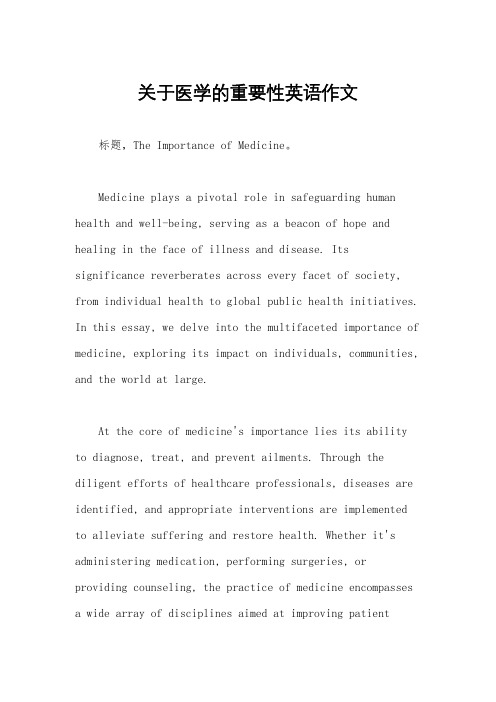
关于医学的重要性英语作文标题,The Importance of Medicine。
Medicine plays a pivotal role in safeguarding human health and well-being, serving as a beacon of hope and healing in the face of illness and disease. Itssignificance reverberates across every facet of society, from individual health to global public health initiatives. In this essay, we delve into the multifaceted importance of medicine, exploring its impact on individuals, communities, and the world at large.At the core of medicine's importance lies its ability to diagnose, treat, and prevent ailments. Through the diligent efforts of healthcare professionals, diseases are identified, and appropriate interventions are implemented to alleviate suffering and restore health. Whether it's administering medication, performing surgeries, or providing counseling, the practice of medicine encompasses a wide array of disciplines aimed at improving patientoutcomes.Moreover, medicine extends beyond the realm oftreatment to encompass preventive care. Vaccinations, screenings, and lifestyle interventions play a crucial role in averting illnesses before they manifest, therebyreducing the burden on healthcare systems and enhancing overall quality of life. By promoting healthy behaviors and fostering awareness, medicine empowers individuals to take charge of their well-being and adopt habits conducive to longevity.In addition to its impact on individuals, medicine profoundly influences the fabric of communities and societies. Access to quality healthcare services is notonly a fundamental human right but also a cornerstone of social equity. By ensuring equitable access to medical care, communities can mitigate health disparities and foster inclusivity, thereby bolstering social cohesion and resilience.Furthermore, medicine intersects with various sectors,including education, economics, and politics, shaping policies and practices that impact public health outcomes. From funding research initiatives to formulating healthcare policies, governments and policymakers play a pivotal role in shaping the landscape of medicine and healthcare delivery. Through collaborative efforts and strategic investments, societies can build robust healthcare systems capable of addressing evolving health challenges and advancing the well-being of their citizens.On a global scale, medicine serves as a unifying force in addressing health crises and pandemics that transcend borders. The COVID-19 pandemic, for instance, underscored the interconnectedness of the world and the urgent need for coordinated responses to emerging threats. Through international collaboration and knowledge-sharing, the global community can harness the collective expertise of healthcare professionals to contain outbreaks, develop vaccines, and mitigate the impact of infectious diseases on a global scale.Moreover, medicine intersects with fields such astechnology and innovation, driving advancements that revolutionize healthcare delivery and patient care. From telemedicine and artificial intelligence to precision medicine and genomics, technological innovations are reshaping the healthcare landscape, making it more accessible, efficient, and personalized. By embracing innovation and embracing interdisciplinary collaboration, the medical community can unlock new frontiers in diagnosis, treatment, and prevention, paving the way for a healthier and more prosperous future.In conclusion, the importance of medicine cannot be overstated, as it serves as a cornerstone of human health and well-being. From individual care to global health initiatives, medicine permeates every aspect of society, offering hope, healing, and resilience in the face of adversity. By recognizing the pivotal role of medicine and investing in its advancement, societies can pave the wayfor a healthier, more equitable world for generations to come.。
医学话题英语作文模板

医学话题英语作文模板英文回答:Common Medical Topics for English Essays。
1. The Importance of Preventive Care。
Preventive care is essential for maintaining good health and preventing illness. It involves taking steps to stay healthy and avoid getting sick, such as:Getting regular checkups and screenings。
Eating a healthy diet。
Exercising regularly。
Maintaining a healthy weight。
Getting enough sleep。
Practicing good hygiene。
Managing stress。
Avoiding tobacco and excessive alcohol use。
By following these simple steps, you can significantly reduce your risk of developing chronic diseases, such as heart disease, stroke, cancer, and diabetes.2. The Role of Technology in Healthcare。
Technology is playing an increasingly important role in healthcare. From electronic health records to telemedicine, technology is helping to improve patient care and make healthcare more accessible and affordable.Some of the ways that technology is being used in healthcare include:Electronic health records (EHRs) allow doctors tostore and share patient information electronically, making it easier to track a patient's medical history and coordinate care.Telemedicine allows patients to consult with doctors remotely, using video conferencing or other technology. This can make it easier for patients to access healthcare, especially in rural or underserved areas.Wearable devices can track a patient's vital signs, such as heart rate and blood pressure, and can provide alerts if a patient's health is at risk.Artificial intelligence (AI) is being used to develop new drugs and treatments, and to assist doctors in making diagnoses.Technology is rapidly changing the way that healthcare is delivered, and it is expected to continue to play a major role in the future of healthcare.3. The Patient-Physician Relationship。
英语作文:医学热Thefeveraboutmedicalschool
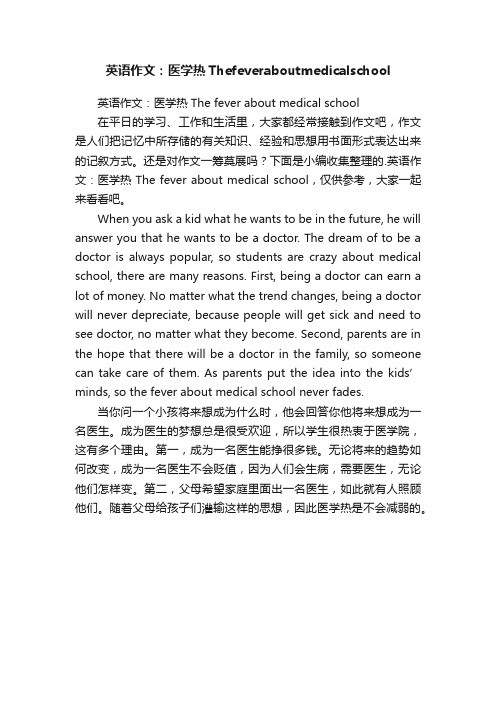
英语作文:医学热Thefeveraboutmedicalschool英语作文:医学热 The fever about medical school在平日的学习、工作和生活里,大家都经常接触到作文吧,作文是人们把记忆中所存储的有关知识、经验和思想用书面形式表达出来的记叙方式。
还是对作文一筹莫展吗?下面是小编收集整理的.英语作文:医学热 The fever about medical school,仅供参考,大家一起来看看吧。
When you ask a kid what he wants to be in the future, he will answer you that he wants to be a doctor. The dream of to be a doctor is always popular, so students are crazy about medical school, there are many reasons. First, being a doctor can earn a lot of money. No matter what the trend changes, being a doctor will never depreciate, because people will get sick and need to see doctor, no matter what they become. Second, parents are in the hope that there will be a doctor in the family, so someone can take care of them. As parents put the idea into the kids’ minds, so the fever about medical school never fades.当你问一个小孩将来想成为什么时,他会回答你他将来想成为一名医生。
医学类作文英文议论文题目
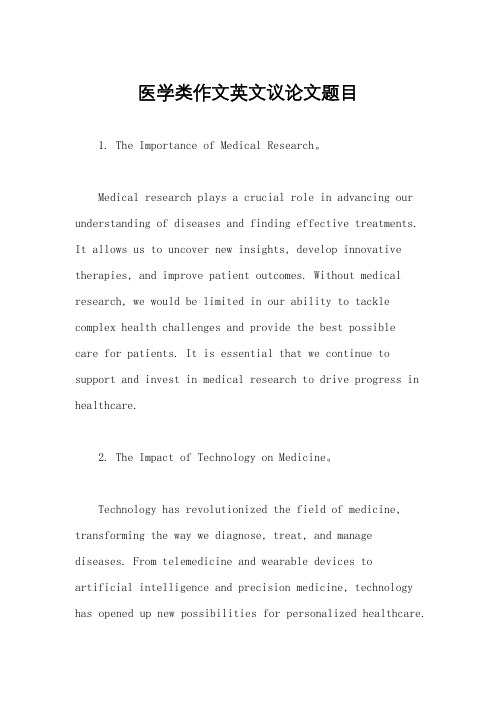
医学类作文英文议论文题目1. The Importance of Medical Research。
Medical research plays a crucial role in advancing our understanding of diseases and finding effective treatments. It allows us to uncover new insights, develop innovative therapies, and improve patient outcomes. Without medical research, we would be limited in our ability to tackle complex health challenges and provide the best possiblecare for patients. It is essential that we continue to support and invest in medical research to drive progress in healthcare.2. The Impact of Technology on Medicine。
Technology has revolutionized the field of medicine, transforming the way we diagnose, treat, and manage diseases. From telemedicine and wearable devices toartificial intelligence and precision medicine, technology has opened up new possibilities for personalized healthcare.It has improved patient access to medical services, enhanced diagnostic accuracy, and enabled more targeted therapies. Embracing technological advancements in medicine is essential to deliver better healthcare outcomes and improve the overall patient experience.3. The Role of Ethics in Medical Practice。
以医学类为主题的英语作文
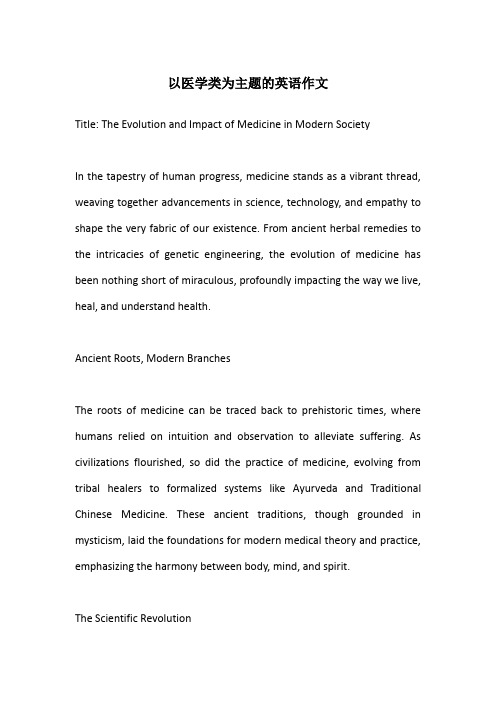
以医学类为主题的英语作文Title: The Evolution and Impact of Medicine in Modern SocietyIn the tapestry of human progress, medicine stands as a vibrant thread, weaving together advancements in science, technology, and empathy to shape the very fabric of our existence. From ancient herbal remedies to the intricacies of genetic engineering, the evolution of medicine has been nothing short of miraculous, profoundly impacting the way we live, heal, and understand health.Ancient Roots, Modern BranchesThe roots of medicine can be traced back to prehistoric times, where humans relied on intuition and observation to alleviate suffering. As civilizations flourished, so did the practice of medicine, evolving from tribal healers to formalized systems like Ayurveda and Traditional Chinese Medicine. These ancient traditions, though grounded in mysticism, laid the foundations for modern medical theory and practice, emphasizing the harmony between body, mind, and spirit.The Scientific RevolutionThe 17th and 18th centuries ushered in a scientific revolution that revolutionized medicine. With the advent of the microscope, physicians gained insights into the microscopic world, leading to the discovery of microorganisms and the understanding of infectious diseases. Advances in anatomy, physiology, and chemistry furthered our comprehension of the human body, paving the way for targeted treatments and prevention strategies.The 20th Century LeapThe 20th century witnessed a quantum leap in medical technology. The discovery of antibiotics revolutionized the treatment of bacterial infections, while vaccines became powerful tools in the fight against infectious diseases. The advent of anesthesia and antisepsis revolutionized surgery, making complex procedures safer and more accessible. Moreover, the rise of specialization within medicine, such as cardiology, oncology, and neurology, allowed for deeper understanding and more effective treatments of specific conditions.Genetic Revolution and BeyondThe 21st century has brought forth a genetic revolution, with groundbreaking discoveries in gene editing technologies like CRISPR-Cas9 promising cures for genetic disorders and personalized medicine tailored to individual DNA profiles. Advances in biotechnology, artificial intelligence, and telemedicine are transforming healthcare delivery, making it more accessible, efficient, and patient-centric.The Impact on SocietyThe evolution of medicine has not only prolonged human lifespan but also significantly improved quality of life. It has reduced infant mortality, controlled epidemics, and alleviated chronic pain. Furthermore, medical progress has fostered global health diplomacy, as nations collaborate to tackle shared health challenges like pandemics and non-communicable diseases.In conclusion, the journey of medicine from ancient wisdom to modern marvels has been a testament to human ingenuity and compassion. As we continue to explore the frontiers of science and technology, the impact of medicine on society will only deepen, ensuring a healthier, more resilient future for all.翻译:标题:医学在现代社会的演变和影响在人类进步的挂毯中,医学是一条充满活力的线,将科学、技术和同理心的进步交织在一起,塑造了我们生存的结构。
医学英语作文话题英语
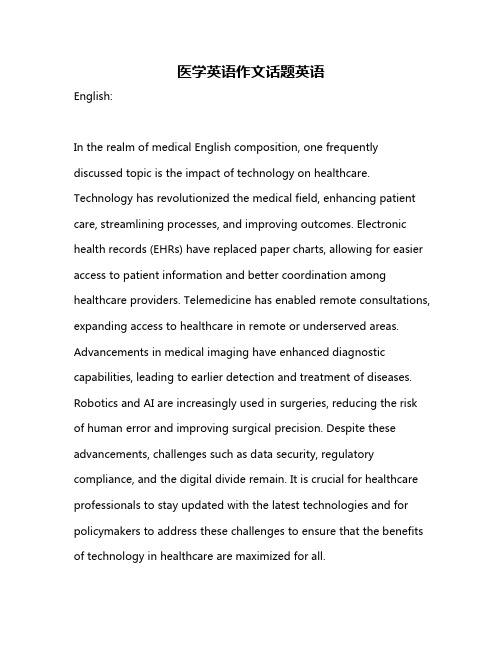
医学英语作文话题英语English:In the realm of medical English composition, one frequently discussed topic is the impact of technology on healthcare. Technology has revolutionized the medical field, enhancing patient care, streamlining processes, and improving outcomes. Electronic health records (EHRs) have replaced paper charts, allowing for easier access to patient information and better coordination among healthcare providers. Telemedicine has enabled remote consultations, expanding access to healthcare in remote or underserved areas. Advancements in medical imaging have enhanced diagnostic capabilities, leading to earlier detection and treatment of diseases. Robotics and AI are increasingly used in surgeries, reducing the risk of human error and improving surgical precision. Despite these advancements, challenges such as data security, regulatory compliance, and the digital divide remain. It is crucial for healthcare professionals to stay updated with the latest technologies and for policymakers to address these challenges to ensure that the benefits of technology in healthcare are maximized for all.Translated content:在医学英语作文中,一个经常讨论的话题是技术对医疗保健的影响。
医学英语作文热点话题
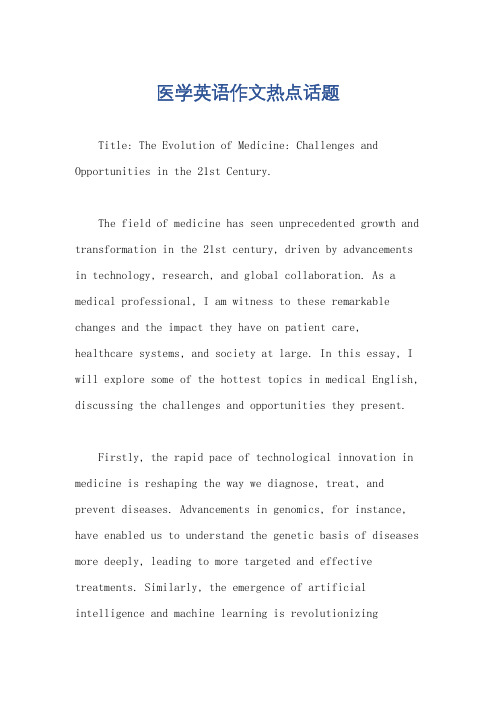
医学英语作文热点话题Title: The Evolution of Medicine: Challenges and Opportunities in the 21st Century.The field of medicine has seen unprecedented growth and transformation in the 21st century, driven by advancements in technology, research, and global collaboration. As a medical professional, I am witness to these remarkable changes and the impact they have on patient care, healthcare systems, and society at large. In this essay, I will explore some of the hottest topics in medical English, discussing the challenges and opportunities they present.Firstly, the rapid pace of technological innovation in medicine is reshaping the way we diagnose, treat, and prevent diseases. Advancements in genomics, for instance, have enabled us to understand the genetic basis of diseases more deeply, leading to more targeted and effective treatments. Similarly, the emergence of artificial intelligence and machine learning is revolutionizingmedical imaging, pathology, and even clinical decision-making. These technological advancements, however, also pose challenges, such as ensuring their accessibility, affordability, and ethical use.Secondly, the global pandemic of COVID-19 has brought into sharp focus the fragility of healthcare systems and the need for urgent reform. The pandemic has highlighted the importance of strong primary healthcare, effective disease surveillance, and rapid vaccine development. It has also exposed the disparities in healthcare access and outcomes across different populations, underscoring the need for more inclusive and equitable health policies.Thirdly, the rise of precision medicine and personalized healthcare is transforming the way we approach patient care. By considering individual genetic, environmental, and lifestyle factors, precision medicine allows us to tailor treatment plans to the specific needs of each patient. This approach, however, requires a shift in medical education and training, as well as the development of new tools and technologies to support it.Fourthly, the growing intersection of medicine and technology is giving rise to new ethical and legal challenges. As we increasingly rely on data and algorithms to make medical decisions, there is a need for robust frameworks to ensure their ethical and legal compliance. This includes addressing issues such as data privacy, informed consent, and the accountability of algorithms.Lastly, the globalized nature of modern medicine presents opportunities for collaboration and knowledge sharing, but also poses challenges in terms of managing and mitigating the spread of diseases and pandemics. The COVID-19 pandemic has demonstrated the importance ofinternational cooperation in addressing global health crises. It has also highlighted the need for strengthened global health security, including the development of vaccines and therapeutics, as well as the strengthening of health systems in lowand middle-income countries.In conclusion, the 21st century presents both challenges and opportunities for medicine. The rapid paceof technological innovation, the global pandemic, the rise of precision medicine, and the intersection of medicine and technology are reshaping the field in profound ways. It is crucial that we continue to adapt, innovate, and collaborate to address these challenges and seize the opportunities they present. By doing so, we can ensure that medicine remains a respected profession that fulfills its important social responsibility of improving the health and well-being of people across the globe.。
医学主题英语作文模板

医学主题英语作文模板英文回答:1. Introduction。
Medicine is a broad field that encompasses the study of human health and disease. It is a challenging and rewarding field that offers endless opportunities for learning and growth. If you are interested in a career in medicine, there are many different paths you can take.2. Pre-Medical Education。
The first step to becoming a doctor is to complete a pre-medical education. This typically involves completing a bachelor's degree in the sciences, such as biology, chemistry, or physics. During your pre-medical education, you will take courses in math, science, and the humanities. You will also need to complete the Medical College Admission Test (MCAT).3. Medical School。
Once you have completed your pre-medical education, you can apply to medical school. Medical school is a four-year program that provides you with the knowledge and skills you need to practice medicine. During medical school, you will take courses in anatomy, physiology, pharmacology, and other medical subjects. You will also complete clinical rotations in different medical specialties, such asinternal medicine, surgery, and pediatrics.4. Residency。
医学专业相关的英语作文
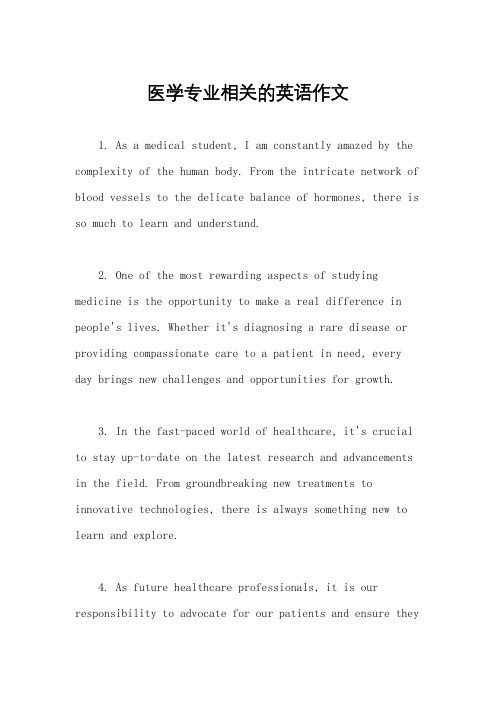
医学专业相关的英语作文1. As a medical student, I am constantly amazed by the complexity of the human body. From the intricate network of blood vessels to the delicate balance of hormones, there is so much to learn and understand.2. One of the most rewarding aspects of studying medicine is the opportunity to make a real difference in people's lives. Whether it's diagnosing a rare disease or providing compassionate care to a patient in need, every day brings new challenges and opportunities for growth.3. In the fast-paced world of healthcare, it's crucial to stay up-to-date on the latest research and advancements in the field. From groundbreaking new treatments to innovative technologies, there is always something new to learn and explore.4. As future healthcare professionals, it is our responsibility to advocate for our patients and ensure theyreceive the best possible care. By working together as a team and collaborating with other healthcare professionals, we can make a real impact on the lives of those we serve.5. Despite the long hours and demanding nature of the job, I wouldn't trade my career in medicine for anything. The opportunity to help others and make a positive impact on the world is truly priceless, and I am grateful for the chance to pursue my passion every day.。
医学生热点主题英语作文

医学生热点主题英语作文Medical Hot TopicsIn recent years, there have been numerous hot topics in the field of medicine that have sparked intense debates and discussions among healthcare professionals, researchers, and the general public. These topics range from controversial medical treatments to ethical dilemmas and advancements in medical technology. In this essay, we will delve into some of the most prominent medical hot topics and explore their implications.One of the most controversial medical topics is euthanasia, also known as assisted suicide. Euthanasia involves the deliberate ending of a person's life to relieve their suffering, especially in cases of terminal illness. While some argue that patients should have the right to a dignified death, others believe that it goes against the principles of medical ethics and the sanctityof life. This topic has divided society and prompted discussions about the boundaries of medical intervention and personal autonomy.Another hot topic in medicine is genetic engineering and gene editing. With the advancement of technologies like CRISPR-Cas9, scientists are now capable of modifying genes to treat genetic diseases or enhance certain traits. However, this raises ethical concerns about the potential for designer babies, where parents could select desired physical or intellectual characteristics for their children. The debate surrounding genetic engineering confronts us with questions about the limits of scientific intervention and the implications for future generations.Vaccines are yet another contentious medical topic. While the vast majority of medical professionals support vaccination as a crucial public health measure, there remains a vocal anti-vaccination movement. This movement is fueled by misinformation and fear, leading to a decline in vaccination rates. The consequences of vaccine hesitancy are evident, as we witness outbreaks of previously controlled diseases such as measles. The challenges posed by vaccine hesitancy underline the importance of accurate information dissemination and public health education.The opioid crisis is a pressing issue that has captured global attention in recent years. The excessive and often inappropriate prescription of opioid painkillers has led to a surge in addiction and overdose deaths. This public health crisis has prompted governments and healthcare providers to review prescribing practices and implement stricter regulations. Additionally, it highlights the need for pain management alternatives and addiction treatment services.Mental health also occupies a significant position in medical hot topics. The recognition of mental illnesses as legitimate medical conditions has sparked discussions about destigmatization and access to mental healthcare. The rising rates of depression, anxiety, and suicide have awakened societies to the importance of holistic healthcare that encompasses both physical and mental well-being. It is crucial to address mental health issues with compassion, empathy, and evidence-based interventions.In conclusion, the field of medicine is no stranger to hot topics that captivate our attention and evoke passionate debates. Whether it's the ethical considerations of euthanasia, the possibilities brought by genetic engineering,the importance of vaccination, the opioid crisis, or the recognition of mental health, these topics pose complex challenges that require careful analysis and informed discussions. As medical knowledge advances, it is crucial to navigate these topics with an open mind, considering the diverse perspectives and ethical implications associated with each issue.。
有关医学的英文作文
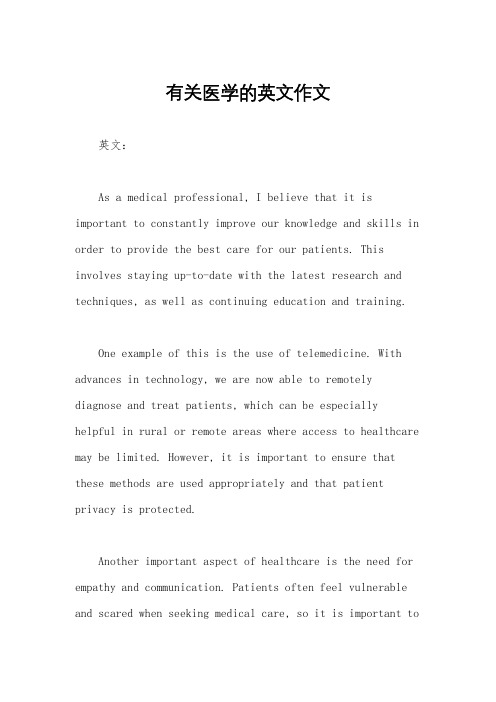
有关医学的英文作文英文:As a medical professional, I believe that it is important to constantly improve our knowledge and skills in order to provide the best care for our patients. This involves staying up-to-date with the latest research and techniques, as well as continuing education and training.One example of this is the use of telemedicine. With advances in technology, we are now able to remotely diagnose and treat patients, which can be especiallyhelpful in rural or remote areas where access to healthcare may be limited. However, it is important to ensure that these methods are used appropriately and that patient privacy is protected.Another important aspect of healthcare is the need for empathy and communication. Patients often feel vulnerable and scared when seeking medical care, so it is important totake the time to listen to their concerns and explain things in a way that they can understand. This can help to build trust and improve patient outcomes.中文:作为一名医疗专业人士,我认为不断提高我们的知识和技能,以便为患者提供最好的护理非常重要。
医学相关题材的英语作文
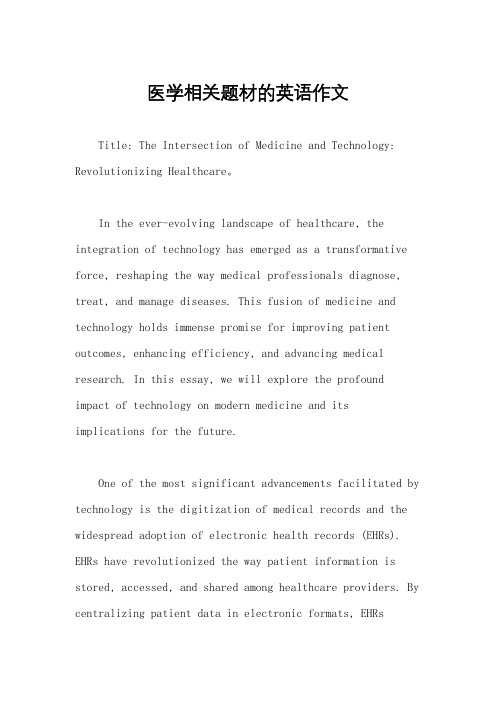
医学相关题材的英语作文Title: The Intersection of Medicine and Technology: Revolutionizing Healthcare。
In the ever-evolving landscape of healthcare, the integration of technology has emerged as a transformative force, reshaping the way medical professionals diagnose, treat, and manage diseases. This fusion of medicine and technology holds immense promise for improving patient outcomes, enhancing efficiency, and advancing medical research. In this essay, we will explore the profound impact of technology on modern medicine and itsimplications for the future.One of the most significant advancements facilitated by technology is the digitization of medical records and the widespread adoption of electronic health records (EHRs). EHRs have revolutionized the way patient information is stored, accessed, and shared among healthcare providers. By centralizing patient data in electronic formats, EHRsenable seamless communication and coordination amongdifferent healthcare settings, reducing the likelihood of medical errors and improving continuity of care.Moreover, the advent of telemedicine has broken down barriers to healthcare access, particularly for individuals in remote or underserved areas. Through telecommunication technologies, patients can now consult with healthcare professionals remotely, receiving timely medical advice and treatment without the need for physical travel. This not only improves convenience for patients but also alleviates strain on healthcare infrastructure by reducing unnecessary hospital visits.In the realm of diagnosis and treatment, technological innovations such as medical imaging techniques have revolutionized medical practice. Modalities such asmagnetic resonance imaging (MRI), computed tomography (CT), and ultrasound allow healthcare providers to visualize internal structures with unprecedented clarity, aiding in the detection and characterization of diseases. Furthermore, advances in artificial intelligence (AI) have enabled thedevelopment of algorithms capable of analyzing medical images with remarkable accuracy, assisting radiologists in interpreting complex data and expediting diagnosis.The field of genomics represents another frontier in medicine where technology has played a pivotal role. The sequencing of the human genome and the development of high-throughput sequencing technologies have ushered in an eraof personalized medicine, where treatments can be tailoredto individual genetic profiles. This precision approach holds promise for more effective therapies with fewer adverse effects, marking a paradigm shift in how we approach disease management.Additionally, wearable devices and health monitoring applications have empowered individuals to take a proactive role in managing their health. From fitness trackers that monitor physical activity to smartwatches capable of detecting abnormal heart rhythms, these technologiesprovide users with real-time insights into their health status, facilitating early intervention and preventive care.Furthermore, the convergence of technology with medical education has transformed the way future healthcare professionals are trained. Virtual reality (VR) simulations and augmented reality (AR) applications offer immersive learning experiences, allowing students to practice procedures and scenarios in a risk-free environment. This not only enhances skill acquisition but also promotes a deeper understanding of complex medical concepts.However, amid the myriad benefits of technology in healthcare, challenges and ethical considerations persist. Issues related to data privacy, cybersecurity, and equitable access to technology must be addressed to ensure that advancements in healthcare benefit all segments of society. Additionally, the rapid pace of technological innovation necessitates ongoing education and training for healthcare professionals to adapt to emerging tools and techniques effectively.In conclusion, the integration of technology into medicine has revolutionized healthcare in ways previously unimaginable. From electronic health records to artificialintelligence and genomics, technological advancements have enhanced diagnostic capabilities, personalized treatments, and empowered patients to actively participate in their healthcare journey. As we continue to embrace innovation, it is imperative that we do so responsibly, prioritizing patient safety, privacy, and equitable access to ensure that the future of healthcare is both technologically advanced and socially inclusive.。
医学生相关的活动及好处英语作文
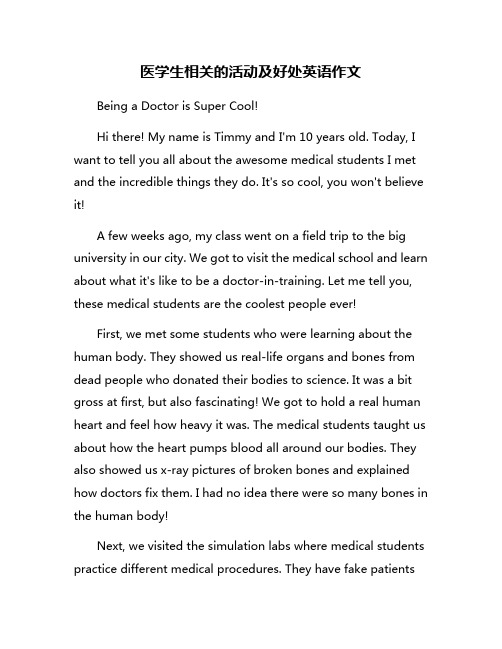
医学生相关的活动及好处英语作文Being a Doctor is Super Cool!Hi there! My name is Timmy and I'm 10 years old. Today, I want to tell you all about the awesome medical students I met and the incredible things they do. It's so cool, you won't believe it!A few weeks ago, my class went on a field trip to the big university in our city. We got to visit the medical school and learn about what it's like to be a doctor-in-training. Let me tell you, these medical students are the coolest people ever!First, we met some students who were learning about the human body. They showed us real-life organs and bones from dead people who donated their bodies to science. It was a bit gross at first, but also fascinating! We got to hold a real human heart and feel how heavy it was. The medical students taught us about how the heart pumps blood all around our bodies. They also showed us x-ray pictures of broken bones and explained how doctors fix them. I had no idea there were so many bones in the human body!Next, we visited the simulation labs where medical students practice different medical procedures. They have fake patientsmade of plastic or rubber that can breathe, bleed, and even talk! The students have to diagnose and treat these pretend patients just like real doctors. We watched as they gave a fake patient an injection, put a cast on a fake broken arm, and even did surgery on a fake body. It was like being on an episode of my favorite medical TV show, but for real!One of the coolest things we saw was the virtual reality room. The medical students put on special goggles that made it feel like they were actually inside a human body. They could walk around and see all the organs, muscles, and bones up close. The student giving our tour let me try on the goggles for a few minutes, and it felt like I had shrunk down to the size of an ant! I could see the heart beating and the lungs inflating with every breath. It was mind-blowing.But the medical students don't just learn about the human body and practice medical procedures. They also have to take classes on how to communicate with patients, work as a team with other healthcare workers, and even manage their own mental health and wellbeing. One student told us that being a doctor is really stressful, so it's important to take care of yourself too.Speaking of mental health, some of the medical students run an awesome program to help kids in the hospital feel better. They get dressed up in fun costumes like superheroes or princesses and go room-to-room to visit the sick kids. They play games, tell jokes, and do little magic tricks to cheer up the children and make them smile. The students said that even though the kids are sick, they are some of the bravest people they know. Doesn't that make you want to give those kids a big high-five?Another really cool thing the medical students do is volunteer at free health clinics around the city. These clinics provide medical care to people who don't have health insurance or can't afford to see a regular doctor. The students help by taking vital signs, giving check-ups, and providing health education. One student I met spoke three different languages, so she could communicate with patients from all over the world. She said that being able to help people in need is one of the most rewarding parts of studying medicine.After our amazing field trip, I am seriously considering becoming a doctor when I grow up. It seems like such an interesting and important job. Can you imagine being the one tohelp sick people get better or even save someone's life? That's like having a real-life superpower!But you know what? I think all that hard work would be worth it. The medical students seemed so passionate about what they were learning and the opportunity to help others. They were kind, caring, and crazy smart. Plus, they get to do the most awesome things, like performing surgery, using high-tech equipment, and even dressing up in costumes to cheer up kids. How cool is that?If I do decide to become a doctor, I'll have to be really good at science and math. I'll need to study my brains out and never give up, even when things get difficult. Luckily, I'm a pretty hard worker (most of the time). And who knows, maybe one day you'll see me walking down the hospital halls in a long white coat!So, what do you think? Does being a medical student sound like the best job ever or what? Getting to help people, work with cutting-edge technology, and make a real difference in the world? Sign me up! I've still got a few years before I have to decide on a career, but this field trip has definitely put medical school at the top of my list. You'll be seeing me on an episode of Surgery Stars someday, I just know it!。
英语作文主题是医生
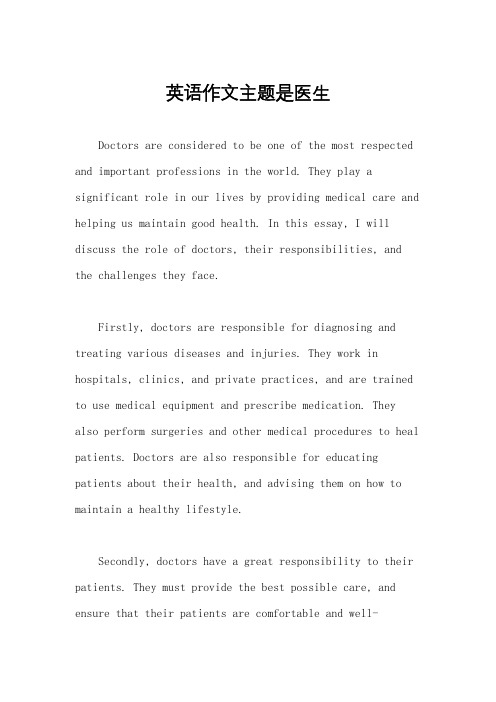
英语作文主题是医生Doctors are considered to be one of the most respected and important professions in the world. They play a significant role in our lives by providing medical care and helping us maintain good health. In this essay, I will discuss the role of doctors, their responsibilities, and the challenges they face.Firstly, doctors are responsible for diagnosing and treating various diseases and injuries. They work in hospitals, clinics, and private practices, and are trained to use medical equipment and prescribe medication. They also perform surgeries and other medical procedures to heal patients. Doctors are also responsible for educating patients about their health, and advising them on how to maintain a healthy lifestyle.Secondly, doctors have a great responsibility to their patients. They must provide the best possible care, and ensure that their patients are comfortable and well-informed. They must also respect their patients’ privacy and maintain confidentiality at all times. Doctors must be compassionate and empathetic towards their patients, and provide them with emotional support during difficult times.However, being a doctor is not an easy job. They face many challenges on a daily basis, such as dealing with difficult patients, long working hours, and the pressure to make life-saving decisions. They must also keep up-to-date with the latest medical advancements and technologies, and constantly improve their skills and knowledge.Moreover, doctors also face ethical dilemmas, such as deciding whether to continue treatment for terminally ill patients or to withdraw treatment. They must also make difficult decisions regarding organ transplants and end-of-life care.In conclusion, doctors play a vital role in our society by providing medical care and helping us maintain good health. They have a great responsibility to their patients, and must constantly improve their skills and knowledge.Despite the challenges they face, doctors continue to work tirelessly to provide the best possible care to their patients. We should appreciate and respect the work of doctors, and support them in their efforts to improve the health and well-being of our communities.。
主题为医生的英语作文
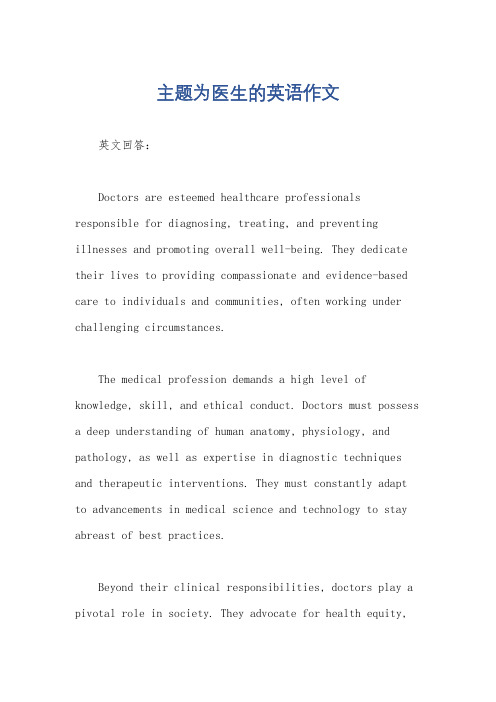
主题为医生的英语作文英文回答:Doctors are esteemed healthcare professionals responsible for diagnosing, treating, and preventing illnesses and promoting overall well-being. They dedicate their lives to providing compassionate and evidence-based care to individuals and communities, often working under challenging circumstances.The medical profession demands a high level of knowledge, skill, and ethical conduct. Doctors must possess a deep understanding of human anatomy, physiology, and pathology, as well as expertise in diagnostic techniques and therapeutic interventions. They must constantly adapt to advancements in medical science and technology to stay abreast of best practices.Beyond their clinical responsibilities, doctors play a pivotal role in society. They advocate for health equity,promote disease prevention, and educate the public about health-related matters. Doctors are trusted sources of medical information and guidance, and they contribute to research and policy development aimed at improving public health.Becoming a doctor requires extensive education and training. After completing an undergraduate degree in a science-related field, aspiring doctors attend medical school, which typically takes four years. Medical school coursework includes both theoretical and practical components, culminating in clinical rotations that provide hands-on experience in various medical specialties.Upon graduating from medical school, doctors embark on residency training programs, which typically last three to seven years depending on the specialty. Residency programs provide supervised practice in a specific area of medicine, allowing doctors to develop specialized knowledge and skills. After completing residency, doctors may choose to pursue fellowships for additional training in subspecialty areas.Throughout their careers, doctors engage in continuous professional development through conferences, workshops, and self-directed learning. They stay informed about the latest medical advancements and techniques to provide the best possible care to their patients.Doctors work in a variety of settings, including hospitals, clinics, private practices, and community health centers. They collaborate with other healthcare professionals, such as nurses, pharmacists, and social workers, to provide comprehensive care. They may also conduct research, teach medical students, or serve in administrative roles.The medical profession is a demanding but incredibly rewarding one. Doctors have the opportunity to make a real difference in the lives of their patients and communities. They are respected for their knowledge, compassion, and commitment to improving health outcomes.中文回答:医生是受人尊敬的医疗保健专业人员,负责诊断、治疗和预防疾病,并促进全面健康。
医学英语作文热点话题
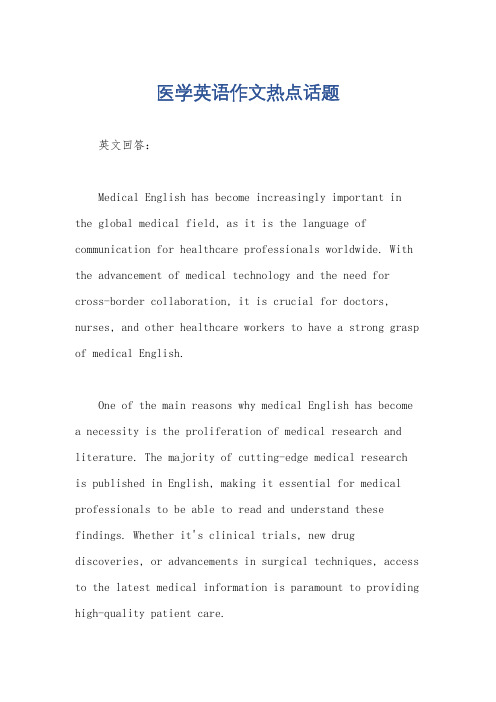
医学英语作文热点话题英文回答:Medical English has become increasingly important in the global medical field, as it is the language of communication for healthcare professionals worldwide. With the advancement of medical technology and the need for cross-border collaboration, it is crucial for doctors, nurses, and other healthcare workers to have a strong grasp of medical English.One of the main reasons why medical English has become a necessity is the proliferation of medical research and literature. The majority of cutting-edge medical research is published in English, making it essential for medical professionals to be able to read and understand these findings. Whether it's clinical trials, new drug discoveries, or advancements in surgical techniques, access to the latest medical information is paramount to providing high-quality patient care.Communication is another vital aspect of healthcarethat is greatly enhanced by the use of medical English. When doctors and nurses communicate with each other, as well as with patients and their families, precise and accurate language is of utmost importance. Medical English provides a common framework for conveying medical information clearly and effectively, reducing the risk of miscommunication and minimizing errors.In the context of international collaboration, medical English plays an indispensable role. With the increasing incidence of global health issues and the need for cross-border cooperation, healthcare professionals from different countries must be able to communicate effectively with each other. Medical English serves as a bridge, enabling medical knowledge and expertise to be shared across borders, fostering collaboration in research, education, and patient care.Furthermore, the use of medical English has significant implications for patient safety. In a globalized healthcaresystem, patients often seek medical attention in countries other than their own. Having a sound understanding of medical English allows healthcare providers to provide accurate diagnoses, prescribe appropriate treatments, and communicate effectively with patients from diverse backgrounds. This not only improves patient outcomes but also builds trust and rapport between patients and healthcare professionals.In summary, medical English has become an essentialtool in the modern medical landscape due to its role in accessing medical information, facilitating effective communication, fostering international collaboration, and enhancing patient safety. As the world continues to shrink and medical knowledge expands at an unprecedented pace, the importance of medical English will only continue to grow.中文回答:医学英语是全球医疗领域日益重要的语言,它是世界各地医疗专业人士的交流语言。
医生为主题的英文作文
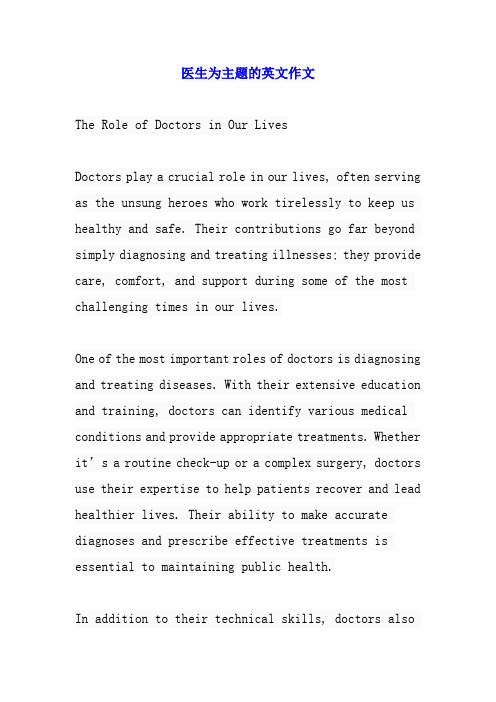
医生为主题的英文作文The Role of Doctors in Our LivesDoctors play a crucial role in our lives, often serving as the unsung heroes who work tirelessly to keep us healthy and safe. Their contributions go far beyond simply diagnosing and treating illnesses; they provide care, comfort, and support during some of the most challenging times in our lives.One of the most important roles of doctors is diagnosing and treating diseases. With their extensive education and training, doctors can identify various medical conditions and provide appropriate treatments. Whether it’s a routine check-up or a complex surgery, doctors use their expertise to help patients recover and lead healthier lives. Their ability to make accurate diagnoses and prescribe effective treatments is essential to maintaining public health.In addition to their technical skills, doctors alsooffer emotional support. Being ill or injured can be a frightening experience, and doctors often serve as a source of reassurance and comfort. They listen to patients' concerns, answer their questions, and explain treatment options in a way that is understandable. This compassionate approach helps alleviate anxiety and fosters a trusting relationship between doctors and patients.Doctors also play a significant role in preventive care. By promoting healthy lifestyles and conducting regular screenings, they help prevent diseases before they occur. They educate patients about the importance of diet, exercise, and regular check-ups, empowering individuals to take control of their health and avoid potential health issues.Moreover, doctors are involved in medical research and advancements. They contribute to the development of new treatments, medications, and technologies that can improve patient care. Their dedication to advancing medical knowledge ensures that healthcare continues toevolve and improve over time.Despite the vital work they do, doctors often face numerous challenges. Long hours, high stress, and the emotional burden of dealing with severe cases can be demanding. Nevertheless, many doctors are driven by a deep sense of purpose and commitment to helping others. Their dedication and sacrifices are commendable and worthy of recognition.In conclusion, doctors are indispensable members of society who make significant contributions to our well-being. They not only treat and diagnose illnesses but also provide emotional support, promote preventive care, and advance medical research. Their hard work and compassion make a profound impact on individuals and communities alike. We owe a great deal of gratitude to these dedicated professionals for their unwavering commitment to improving our health and quality of life.。
医学生热点主题英语作文

医学生热点话题英语作文一、1. 现在大学校园里,迟到、早退、旷课是常见的现象2. 保证学生的出勤率对大学教育的重要性3. 作为一个大学生应该怎样做Attend_Your_Classes_RegularlyAs we can see, there is a common phenomenon in universities nowadays. Plenty of college students form the bad habits of being late at classes, leave the classes before it's over or they are absent from the classes. That's becoming a more and more serious problems.Students skip classes for a variety of reasons. Some thinks the classes or their teachers are boring, some are addicted to computer games, others just don't want to study and waste their time. All these are pretty harmful for their road of growth.So we must realize the importance of attendance rate of classes. For the basest cause, we should show our sincere respect to our selfless teachers. They stand on the platform for hours every day so how can we ignore their hard-work? Then as for ourselves, we must treasure the chance and our youth to learn as much as knowledge, because we can nearly impossible live a good life in the rapid developing world without enough abilities. The most important thing is that what a person does now can reflect his attitude to his life. Only a positive man can achieve his dreams.Therefore, all the students should remember their own responsibilities. Attending at a class means not only you can hand your professional knowledge, but also expressyou respect to you teachers. And one can gradually get into the good habit of being strict with himself.At last, a class is not just a major class. It's a class of your life. How can we skip it?By GBSYT 二、如何做个好医生,如今的医患关系在许多人眼里都比较紧张,那么,在你的眼里,如何才算是一个好医生呢?My view on a good doctorYou are free to give your opinion on the qualities that can make one a good doctorIn many people's eyes, doctor is a holy profession, because a doctor can cure the disease and safe people's lives. However, with many medical accident and the increasing charge for medicine in the recent years, people have gradually changed their mind on doctors.So, what is leading to this situation? Maybe some doctors nowadays are not qualified. So only when a doctor gets people's approval can he really be a "real " doctor. And what is a good doctor?In my opinion, a good doctor must be kind-hearted enough at first. The doctor, whose responsibility is to help people who are in need, should express sympathy to his patients. He should give first rank to the patients' health. Then, an exactly necessary quality for a good doctor is selflessness. As a doctor, he can't focus on his position and wealth. Now that the patient has put his life to your hands and staked all his hope on you, how could you only care of your own interest? A doctor must have his clear conscience.Of course, a doctor can't not only have a heart but no strength. An excellent doctor should also be skilful. A doctor surely can't not guarantee a cure and defeat all disease, but he should have his own ability to help as many as patients, just because he is a doctor.Besides, a good doctor should be courageous, patient, hard-working and so on. In fact, to all the people, a good doctor is just simply expected to serve the people wholeheartedly, with his love and his ability.And I believe that I can become a good doctor in the future.By GBSYT 三、“看病难”、“看病贵”长期困扰着城市普通居民,也成为从中央到地方着力破解的重要民生问题。
- 1、下载文档前请自行甄别文档内容的完整性,平台不提供额外的编辑、内容补充、找答案等附加服务。
- 2、"仅部分预览"的文档,不可在线预览部分如存在完整性等问题,可反馈申请退款(可完整预览的文档不适用该条件!)。
- 3、如文档侵犯您的权益,请联系客服反馈,我们会尽快为您处理(人工客服工作时间:9:00-18:30)。
医学生热点话题英语作文一、1. 现在大学校园里,迟到、早退、旷课是常见的现象2. 保证学生的出勤率对大学教育的重要性3. 作为一个大学生应该怎样做Attend_Your_Classes_RegularlyAs we can see, there is a common phenomenon in universities nowadays. Plenty of college students form the bad habits of being late at classes, leave the classes before it's over or they are absent from the classes. That's becoming a more and more serious problems.Students skip classes for a variety of reasons. Some thinks the classes or their teachers are boring, some are addicted to computer games, others just don't want to study and waste their time. All these are pretty harmful for their road of growth.So we must realize the importance of attendance rate of classes. For the basest cause, we should show our sincere respect to our selfless teachers. They stand on the platform for hours every day so how can we ignore their hard-work? Then as for ourselves, we must treasure the chance and our youth to learn as much as knowledge, because we can nearly impossible live a good life in the rapid developing world without enough abilities. The most important thing is that what a person does now can reflect his attitude to his life. Only a positive man can achieve his dreams.Therefore, all the students should remember their own responsibilities. Attending at a class means not only you can hand your professional knowledge, but also express you respect to you teachers. And one can gradually get into the good habit of being strict with himself.At last, a class is not just a major class. It's a class of your life. How can we skip it?By GBSYT二、如何做个好医生,如今的医患关系在许多人眼里都比较紧张,那么,在你的眼里,如何才算是一个好医生呢?My view on a good doctorYou are free to give your opinion on the qualities that can make one a good doctorIn many people's eyes, doctor is a holy profession, because a doctor can cure the disease and safe people's lives. However, with many medicalaccident and the increasing charge for medicine in the recent years, people have gradually changed their mind on doctors.So, what is leading to this situation? Maybe some doctors nowadays are not qualified. So only when a doctor gets people's approval can hereally be a "real " doctor. And what is a good doctor?In my opinion, a good doctor must be kind-hearted enough at first. The doctor, whose responsibility is to help people who are in need, should express sympathy to his patients. He should give first rank to the patients' health.Then, an exactly necessary quality for a good doctor is selflessness. As a doctor, he can't focus on his position and wealth. Now that thepatient has put his life to your hands and staked all his hope on you, how could you only care of your own interest? A doctor must have his clear conscience.Of course, a doctor can't not only have a heart but no strength. An excellent doctor should also be skilful. A doctor surely can't not guarantee a cure and defeat all disease, but he should have his ownability to help as many as patients, just because he is a doctor.Besides, a good doctor should be courageous, patient, hard-working andso on. In fact, to all the people, a good doctor is just simply expected to serve the people wholeheartedly, with his love and his ability.And I believe that I can become a good doctor in the future.By GBSYT三、“看病难”、“看病贵”长期困扰着城市普通居民,也成为从中央到地方着力破解的重要民生问题。
请分析这个问题出现的原因,你认为如何才能解决这个问题?How to solve the problem of cannot afford to see a doctorThe passage tells us that most of the peasant workers always can'tafford to see a doctor when they work in other cities. When they areill , they don't go to see a doctor unless their illness is fairly worse. Most of the cases they tolerate the disease or only go to see thedoctors at a small clinic beside the streets. This can cause healthproblems to them and break the harmony of our society. So we must take some actions to solve the problem.One of the most important reasons for this issue is that the drug price is too high for the peasant workers to charge. So the price department should take the responsibility to adapt the price properly. In thatcase , the drug price can be accepted in the ability of the workers.And then, the government should pay more for improving the medical facilities in the hospitals so that the sufferers can enjoy better treatment with less payments. Besides, the government can give some allowances to the peasant workers who just support their family with low wages . After all, they are working for the cities and making their contributions.At last but not least , rising low-salaried people's wages is of great necessary in some cases. Even without the money to pay for their rent or support their children's school fee , how dare they see a doctor with relief? Money is more important than their health or even their lives in their eyes at that time.As long as the institutions at other aspects can be improved, I believe the problem of difficulties and high expense of getting medical treatment can be gradually solvedBy GBSYT。
